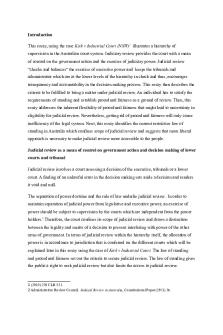Judicial Review Essay PDF

| Title | Judicial Review Essay |
|---|---|
| Course | Constitutional and Administrative Law |
| Institution | University of Leicester |
| Pages | 3 |
| File Size | 94.3 KB |
| File Type | |
| Total Downloads | 24 |
| Total Views | 333 |
Summary
The primary role of judicial review is to protect individuals from abuses of state power. It is solely concerned with the legality of a decisions made by public bodies and should by no means be taken as an appeal. Judicial review aims not change the decision given but instead discipline the ways in ...
Description
The primary role of judicial review is to protect individuals from abuses of state power. It is solely concerned with the legality of a decisions made by public bodies and should by no means be taken as an appeal. Judicial review aims not change the decision given but instead discipline the ways in which the decision was made. Upon assessing the preliminary arguments of Adele’s case, it is clear that she has a right to challenge the ways in which her appeal was conducted through the doctrine of judicial review. The first consideration I had to make before determining that Adele’s case was eligible for review was whether or not the Association of Will Writers (AWW) is liable to common law judicial review. As the ‘not-for-profit’ association has been created by contract and not by statute, its rules are decided by its members and proceedings are carried out within a private sphere. However, the roles exercised by the AWW ultimately operate as a governmental function and although Adele’s hearing is initially a private one, I drew on the ruling in R v Panel on Takeovers and Mergers, ex P Datafin plc1 to conclude that “private bodies which effectively performed public law functions are amenable to judicial review”, rendering the AWW open to scrutiny. Now we have confirmed that Adele’s hearing is eligible for review, we must isolate the miscarriages of natural justice within the proceedings. The first prominent misconduct is that Adele was denied the right to legal representation, under the Tarrant test as asserted by Webster in R v SS for the Home Dep., ex parte Tarrant2, there are a number of criteria that must be taken into consideration before determining whether a defendant is entitled to a legal counsel. In Adele’s case the allegations against her render her susceptible to three of the proposed categories of the Tarrant test. The charge against her are for one, a serious claim as they accuse her of breaching the conditions of her membership. In addition, the consequences attached to her dismissal will indisputably affect her career. Possibly the most important factor is that she has not been given sufficient time or allowed appropriate resources to respond to the charges against her. Adele was deprived of reasonable notice of her appeal hearing and as declared in Lee v DES3, by law the minimum amount of time required for a defendant to respond to a charge is 4 weeks. Adele was only given 2 days to prepare for her hearing, an inadequate amount of time for anyone to prepare a case of defence. This is ultimately a breach of article 6 of the European Convention of Human Rights which states that everyone has the right to a fair trial. Adele’s legal counsel could argue that another fundamental principle of a fair hearing is that the defendant is granted reasonable grounds to participate appropriately in the decisionmaking process. Adele’s inability to cross-examine the disciplinary officer or view the documents/evidence used against her is a clear breach of current principles of procedural fairness as set out under the common law. Adele should have been allowed to interrogate the Disciplinary Officer’s evidence as this was in the interests of her career as a will writer. Moreover, an integral part of natural justice is that the decision-makers remain impartial. In order for hearing to remain impartial, there must not be or appear to be any bias. Relative to judicial review, bias is categorised into three distinctions with automatic disqualification (where a member of the judge or jury are shown to have an interest in the outcome of the 1 [1987] QB 815 2 [1985] QB 251 3 [1968] 66 LGR 211
case and are thereby no longer allowed to contribute to the ruling) being the most prominent. In light of previous cases such as Dimes V Grand Junction Canal, whereby the judge was found to have a pecuniary interest in the outcome of the case, strict rules have been established to ensure that decision makers have no vested interests or personal attachments to any case they may deliberate over. Arguably, not all cases are related to monetary interest, as proven in the more recent case of R V Bow Street Metropolitan Stipendiary Magistrate, ex parte Pinochet 4where it was upheld that Lord Hoffman’s nonfinancial interest in the case still meant he was eligible for dismissal. This form of bias is emphasised through Adele’s discovery that two of the three members on the appeal tribunal have external involvement in the will writing industry. One of the members being the uncle of one of her closest competitors and another member has written numerous articles criticising the poor treatment of elderly clients by will writers. Therefore, it is just to say that the adjudicative decision to reject Adele’s appeal was made with procedural improprieties. Although the member who writes the article after mistreatment of elderly people may have an expected bias towards Adele as she is accused of similar actions, the member whose family member is Adele’s business rival may have a personal bias in seeing Adele dismissed, thus Adele has a strong case against the members of the appeal tribunal who of which potentially benefit from her discharge. In relation to Adele’s claim that no suitable reason for rejection of her appeal was provided, as it stands there is no “universal obligation” 5for public bodies to provide reasons for their decisions. However, in cases such as R v Secretary of State for the Home Department, Ex parte Doody6, Lord Mustil judged that in the interests of ‘fairness’ the Home Secretary had to give reason for their decision not to release the convict after serving his minimum term, suggesting that although the Home Secretary’s decision was made using a statutory power, this power was “granted with the implicit assumption that they will be wielded fairly”7. It may be more reasonable to conclude that the general rule is that in honour of procedural fairness, an explanation ought to be given “unless there is a proper justification for not doing so”. 8
UK Cases 1. 2. 3. 4. 5. 6.
R v Panel on Takeovers and Mergers, ex P Datafin plc [1987] QB 815 R v SS for the Home Dep., ex parte Tarrant [1985] QB 251 Lee v Department of Education and Science [1968] 66 LGR 211 R v Bow Street Metropolitan Stipendiary Magistrate, Ex Parte Pinochet Ugarte [1998] UKHL 41 Oakley v South Cambridgeshire District Council [2017] EWCA Civ 71 R v Secretary of State for the Home Department, Ex parte Doody [1994] 1 AC 531
Bibliography 1. Elliot, M. Thomas, R. (2014) Public Law, Second Edition 2. Thompson, B. Gordon, M. (2017) Cases & Materials on Constitutional & Administrative Law 3. Craven, R. Dr (2018) Securing Legal Accountability Under the Constitution 4 [1998] UKHL 41 5 Oakley v South Cambridgeshire District Council [2017] EWCA Civ 71 6 [1994] 1 AC 531 7 Oakley v South Cambridgeshire District Council [2017] EWCA Civ 71 8 Oakley v South Cambridgeshire District Council [2017] EWCA Civ 71...
Similar Free PDFs

Judicial Review Essay
- 3 Pages

EU and Judicial Review Essay
- 5 Pages

Judicial Review
- 15 Pages

Judicial Review
- 50 Pages

Judicial Review
- 6 Pages

Judicial Review
- 40 Pages

Judicial Review
- 7 Pages

Judicial Review Complete 2
- 54 Pages

Judicial Review (ALL!)
- 8 Pages

Judicial Review- irrationality
- 4 Pages

Judicial Review notes
- 1 Pages

Analisis Sejarah Judicial Review
- 5 Pages

ADMIN LAW Judicial Review
- 5 Pages

Ilegality - Judicial Review
- 5 Pages
Popular Institutions
- Tinajero National High School - Annex
- Politeknik Caltex Riau
- Yokohama City University
- SGT University
- University of Al-Qadisiyah
- Divine Word College of Vigan
- Techniek College Rotterdam
- Universidade de Santiago
- Universiti Teknologi MARA Cawangan Johor Kampus Pasir Gudang
- Poltekkes Kemenkes Yogyakarta
- Baguio City National High School
- Colegio san marcos
- preparatoria uno
- Centro de Bachillerato Tecnológico Industrial y de Servicios No. 107
- Dalian Maritime University
- Quang Trung Secondary School
- Colegio Tecnológico en Informática
- Corporación Regional de Educación Superior
- Grupo CEDVA
- Dar Al Uloom University
- Centro de Estudios Preuniversitarios de la Universidad Nacional de Ingeniería
- 上智大学
- Aakash International School, Nuna Majara
- San Felipe Neri Catholic School
- Kang Chiao International School - New Taipei City
- Misamis Occidental National High School
- Institución Educativa Escuela Normal Juan Ladrilleros
- Kolehiyo ng Pantukan
- Batanes State College
- Instituto Continental
- Sekolah Menengah Kejuruan Kesehatan Kaltara (Tarakan)
- Colegio de La Inmaculada Concepcion - Cebu

